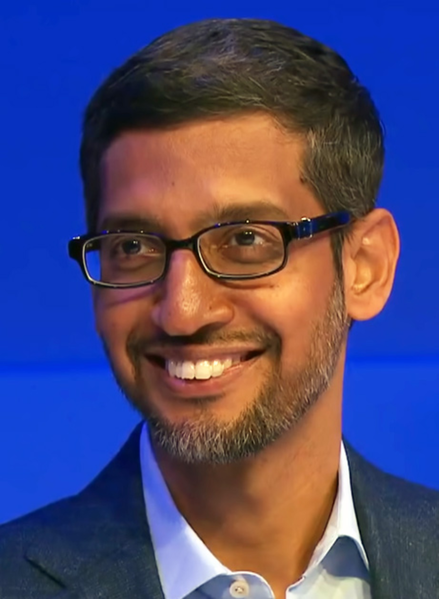Sundar Pichai: Inspiring Leadership Lessons for Tomorrow’s Visionaries

Unveiling the Leadership Legacy of Sundar Pichai: Lessons from a Tech Visionary
In the ever-evolving landscape of leadership, few names have captured the attention and admiration of aspiring leaders and industry experts as much as Sundar Pichai. As the CEO of Google and Alphabet Inc., Pichai has not only steered one of the world’s most influential and innovative companies but has also become a symbol of visionary leadership and strategic thinking.
Sundar Pichai’s journey from a modest upbringing in Chennai, India, to the pinnacle of the tech industry is a testament to his unwavering commitment, exceptional talents, and remarkable leadership acumen. Over the course of his illustrious career, Pichai has become a source of inspiration and a case study for leadership development.
Studying the leadership lessons and stories of influential leaders like Sundar Pichai can offer valuable insights and guidance for aspiring leaders in any field. By delving into Pichai’s experiences, strategies, and accomplishments, we can uncover the principles and practices that have guided his success, and explore how they can be applied in our own leadership journeys.
This article aims to provide a comprehensive exploration of Sundar Pichai’s leadership style, highlighting the lessons learned from his remarkable trajectory. From his early life and formative experiences to his visionary initiatives and ability to navigate challenges, we will examine the various facets that have shaped Pichai into the exemplary leader he is today.
One key aspect that sets Sundar Pichai apart is his embodiment of visionary leadership. Pichai’s ability to conceive and execute ambitious projects, while inspiring and motivating his teams, has propelled Google’s growth and innovation. By analyzing Pichai’s visionary approach, we can extract valuable insights on how to develop and communicate a compelling vision that drives organizational success.
Another vital element of Pichai’s leadership is his demonstration of emotional intelligence and empathy. Through fostering a culture of inclusivity and empathy at Google, Pichai has created an environment that nurtures talent, encourages collaboration, and supports individual growth. Exploring Pichai’s practices in emotional intelligence can provide valuable lessons for leaders looking to cultivate a positive and people-centric organizational culture.
Moreover, Sundar Pichai’s journey has not been without its share of challenges and pivotal decisions. From navigating complex industry disruptions to addressing controversies, Pichai has displayed remarkable resilience and strategic decision-making abilities. Examining his experiences in times of adversity can illuminate valuable insights on how to navigate challenges, make tough decisions, and lead through change effectively.
Additionally, communication and collaboration have been pivotal to Pichai’s success. His transparent and effective communication style has fostered a sense of trust and clarity within Google, enabling teams to collaborate and innovate at a remarkable pace. By dissecting Pichai’s communication strategies, we can glean lessons on how to inspire and align teams towards shared goals through effective communication and collaboration.
Furthermore, Pichai’s commitment to developing future leaders and nurturing talent has been a cornerstone of his leadership approach. His initiatives in mentorship and talent development have not only empowered individuals within Google but have also contributed to the broader leadership landscape. Understanding Pichai’s practices in inspiring and developing future leaders can provide valuable guidance for cultivating leadership potential within organizations.
As we embark on this exploration of Sundar Pichai’s leadership journey, it is essential to recognize the enduring legacy he has created. Pichai’s accomplishments and the principles he embodies continue to inspire leaders globally, shaping the next generation of visionaries and changemakers.
Join us as we delve into the remarkable leadership lessons and stories of Sundar Pichai, unraveling the strategies and insights that have propelled him to the forefront of the leadership landscape. By studying his experiences, we can glean invaluable knowledge and inspiration to forge our own path towards leadership excellence.
Early Life and Formative Experiences
Background and Upbringing of Sundar Pichai
Sundar Pichai was born and raised in Chennai, India, in a middle-class family. From an early age, Pichai displayed exceptional intellectual curiosity and a passion for knowledge. His parents, both diligent professionals, instilled in him the values of hard work, perseverance, and the pursuit of excellence. Pichai’s humble beginnings and the strong foundation laid by his family would serve as the bedrock of his future success.
Early Educational and Professional Journey
Pichai’s academic journey showcased his exceptional talents and intellectual prowess. He earned a Bachelor’s degree in Metallurgical Engineering from the Indian Institute of Technology (IIT) Kharagpur, where he stood out as a top performer. This early educational experience provided him with a strong technical foundation and honed his analytical and problem-solving skills.
Seeking new horizons, Pichai pursued higher education in the United States, obtaining a Master’s degree in Material Sciences and Engineering from Stanford University. This transition to a foreign country not only expanded his academic horizons but also exposed him to a multicultural environment, fostering his adaptability and global perspective.
Key Experiences and Influences that Shaped His Leadership Style
During his early career, Pichai worked at Applied Materials as an engineer, where he gained valuable industry experience and refined his technical expertise. However, it was his pivotal decision to join Google in 2004 that would set the stage for his meteoric rise.
At Google, Pichai quickly distinguished himself with his exceptional problem-solving abilities and strategic thinking. He played a crucial role in the development of Google Chrome, the game-changing web browser that revolutionized internet browsing. This achievement showcased Pichai’s visionary mindset, his ability to identify untapped opportunities, and his determination to push the boundaries of innovation.
Pichai’s leadership style was also influenced by his mentors and colleagues at Google. Working closely with Larry Page, Sergey Brin, and Eric Schmidt, he absorbed invaluable lessons on leadership, innovation, and the importance of a bold vision. These influential figures recognized Pichai’s potential early on and entrusted him with increasingly important responsibilities, which further fueled his growth as a leader.
Furthermore, Pichai’s exposure to Google’s unique work culture, characterized by a flat organizational structure and a focus on creativity and autonomy, played a significant role in shaping his leadership philosophy. He witnessed firsthand the power of fostering a culture that nurtures and empowers employees, allowing them to take risks, experiment, and drive groundbreaking ideas.
The confluence of Pichai’s early experiences, education, and exposure to Google’s dynamic environment laid the groundwork for the leadership qualities that would define his success in the years to come. His technical expertise, coupled with his strategic thinking, adaptability, and passion for innovation, positioned him as a leader capable of driving transformational change.
As we delve deeper into Sundar Pichai’s leadership journey, it becomes evident that his early life and formative experiences have played a pivotal role in shaping his leadership style. The strong values instilled by his family, his academic pursuits, and the influential moments and individuals he encountered along the way have molded Pichai into the remarkable leader he is today.
Climbing the Ranks at Google
Pichai’s Entry into Google and Initial Roles
Sundar Pichai’s entry into Google marked the beginning of a transformative period for both him and the company. In 2004, Pichai joined Google as a product manager, where he demonstrated his exceptional technical acumen and a keen understanding of user needs. He quickly made a mark with his ability to translate complex technological concepts into user-friendly experiences, earning the respect and recognition of his colleagues.
Demonstrating Exceptional Technical Prowess and Problem-Solving Abilities
One of the defining aspects of Pichai’s early career at Google was his deep understanding of technology and his ability to solve complex problems. His contributions to Google’s search and advertising platforms were instrumental in enhancing the user experience and driving revenue growth. Pichai’s technical prowess not only earned him the trust of his team but also caught the attention of Google’s top executives.
Transitioning into Leadership Positions within Google
Recognizing Pichai’s leadership potential, Google’s co-founders, Larry Page and Sergey Brin, entrusted him with increasing responsibilities. Pichai took on roles such as Vice President of Product Development and later, Senior Vice President of Chrome and Apps. In these positions, he showcased his ability to lead cross-functional teams, drive innovation, and execute transformative projects.
Pichai’s leadership was characterized by his inclusive and collaborative approach, which fostered a sense of unity and purpose among his team members. He empowered his teams to experiment and take calculated risks, creating an environment conducive to innovation and growth.
Key Milestones and Achievements During His Tenure
Under Pichai’s leadership, Google achieved several significant milestones and launched innovative products that revolutionized various industries. One of the most notable successes was the introduction of Google Chrome, which rapidly gained market share and became the world’s most widely used web browser. Pichai’s vision and strategic decision-making played a crucial role in positioning Chrome as a dominant player in the browser market.
Another milestone in Pichai’s career was the development and launch of Android, Google’s mobile operating system. Pichai recognized the potential of the burgeoning smartphone industry and led the efforts to create a flexible and open platform that would empower mobile users worldwide. Android’s widespread adoption and continuous innovation have cemented its position as the leading mobile operating system globally.
Furthermore, Pichai played a pivotal role in driving Google’s cloud computing initiatives. As the demand for cloud services surged, Pichai spearheaded the development of Google Cloud Platform (GCP), which offered scalable and reliable cloud solutions to businesses. Pichai’s strategic vision and emphasis on cloud technology positioned Google as a formidable competitor in the cloud market.
In addition to product innovations, Pichai’s leadership was instrumental in fostering a culture of diversity and inclusion at Google. He recognized the importance of building diverse teams and promoting equity within the organization. Pichai’s commitment to fostering a welcoming and inclusive work environment has had a lasting impact on Google’s culture and has become a benchmark for other companies in the industry.
Throughout his tenure at Google, Sundar Pichai’s leadership has been defined by his ability to blend technical expertise, strategic thinking, and a people-centric approach. His visionary initiatives, technical acumen, and inclusive leadership style have propelled Google to new heights and solidified its position as a global leader in the technology industry.
As we examine Pichai’s ascent within Google, it becomes evident that his leadership journey is characterized by a relentless pursuit of excellence, an unwavering focus on user needs, and a deep understanding of technological trends. Sundar Pichai’s ability to navigate the complex landscape of the tech industry and drive innovation serves as a remarkable example for aspiring leaders seeking to make a lasting impact in their respective fields.
Visionary Leadership
Definition and Characteristics of Visionary Leadership
Visionary leadership is characterized by the ability to create and articulate a compelling vision for the future. It involves inspiring and motivating others to share in that vision and working collaboratively towards its realization. Visionary leaders possess a deep understanding of industry trends, technological advancements, and customer needs, enabling them to anticipate changes and lead their organizations with foresight and innovation.
How Sundar Pichai Embodies Visionary Leadership
Sundar Pichai’s leadership journey exemplifies the essence of visionary leadership. Throughout his tenure at Google, he has consistently demonstrated the ability to envision and execute transformative ideas that have reshaped industries and propelled Google’s growth. Pichai possesses a keen foresight that enables him to identify emerging trends and anticipate future market demands.
Pichai’s ability to communicate his vision effectively has been instrumental in rallying teams around shared goals and inspiring them to push boundaries. He has a talent for distilling complex concepts into clear, compelling narratives that resonate with employees, stakeholders, and the broader community. Pichai’s communication style is inclusive, transparent, and authentic, fostering trust and commitment among his teams.
Examples of Pichai’s Visionary Initiatives and Projects at Google
-
Advancing Artificial Intelligence (AI): Pichai recognized the transformative potential of AI early on and has been a driving force in its integration across Google’s products and services. He spearheaded the development of Google Assistant, an AI-powered virtual assistant, and Google Duplex, an AI system that can make phone calls on behalf of users. Pichai’s vision of an AI-driven future has positioned Google at the forefront of innovation in this field.
-
Expansion into Hardware: Under Pichai’s leadership, Google expanded its hardware portfolio, introducing products such as Pixel smartphones, Chromecast, and Google Home. Pichai saw the opportunity to integrate Google’s software prowess with high-quality hardware to deliver seamless user experiences across devices. This strategic move diversified Google’s offerings and strengthened its position in the competitive consumer electronics market.
-
Sustainability and Renewable Energy: Pichai has placed a strong emphasis on sustainability and environmental responsibility. Google has made significant investments in renewable energy projects and is committed to operating as a carbon-neutral company. Pichai’s vision of a greener future aligns with Google’s core values and resonates with stakeholders who prioritize sustainability.
Lessons to Learn from Pichai’s Approach to Inspiring and Leading with a Vision
-
Cultivate a forward-thinking mindset: Visionary leaders need to stay informed about industry trends, emerging technologies, and customer needs. Cultivating a continuous learning mindset and fostering curiosity allows leaders to anticipate and capitalize on future opportunities.
-
Articulate a compelling vision: Clearly communicate the vision to inspire and engage others. Use storytelling techniques to paint a vivid picture of the future and connect emotionally with stakeholders. A compelling vision provides a sense of purpose, direction, and motivation to drive collective efforts.
-
Foster innovation and experimentation: Encourage a culture of innovation and risk-taking within the organization. Provide resources, support, and autonomy for teams to explore new ideas and experiment. Embrace failures as learning opportunities and celebrate successes to reinforce the importance of innovation.
-
Embrace collaboration and inclusivity: Visionary leaders recognize the value of diverse perspectives and actively seek input from team members. Foster a collaborative environment where everyone feels empowered to contribute their ideas and expertise. Inclusivity enhances creativity, problem-solving, and the overall quality of decision-making.
-
Adaptability and agility: The ability to adapt to changing circumstances and navigate uncertainty is crucial for visionary leaders. Embrace a growth mindset, remain agile, and be open to adjusting strategies as needed. Recognize that the vision itself may evolve as the organization and external landscape evolve.
Sundar Pichai’s visionary leadership has propelled Google to new heights and has inspired countless leaders across industries. His ability to anticipate market shifts, articulate a compelling vision, and empower teams to turn that vision into reality has positioned him as a role model for aspiring leaders. By embracing the lessons derived from Pichai’s visionary approach, leaders can foster innovation, drive growth, and create a lasting impact in their organizations.
Emotional Intelligence and Empathy
Importance of Emotional Intelligence in Leadership
Emotional intelligence, often referred to as EQ, plays a crucial role in effective leadership. It encompasses the ability to recognize and understand one’s own emotions and those of others, and to use this awareness to guide behavior, manage relationships, and make informed decisions. Leaders with high emotional intelligence are adept at fostering positive relationships, resolving conflicts, and creating an inclusive and supportive work environment.
Sundar Pichai’s Demonstration of Emotional Intelligence
Sundar Pichai’s leadership style exemplifies the importance of emotional intelligence. He possesses a remarkable ability to connect with individuals on a personal level, actively listen to their perspectives, and show empathy towards their experiences. Pichai’s genuine and approachable demeanor fosters an environment where employees feel heard, valued, and empowered.
Pichai’s emotional intelligence is evident in his public addresses and interactions. He displays composure in high-pressure situations, handles challenging conversations with tact and empathy, and remains grounded amidst rapid changes and demanding circumstances. This emotional resilience enables him to inspire and motivate others during both times of success and adversity.
Building a Culture of Empathy and Inclusivity at Google
Under Pichai’s leadership, Google has placed a strong emphasis on fostering a culture of empathy and inclusivity. Pichai recognizes the importance of diversity and actively promotes an environment where individuals from all backgrounds feel welcome and valued. He has implemented initiatives to increase diversity within Google’s workforce, addressing biases and promoting equal opportunities.
Pichai encourages open dialogue and actively seeks diverse perspectives, acknowledging that varied viewpoints lead to more robust decision-making. By prioritizing empathy and inclusivity, Pichai has created a workplace culture that nurtures collaboration, innovation, and personal growth.
Lessons on Fostering Emotional Intelligence and Empathy in Leadership Roles
-
Self-awareness: Leaders must cultivate self-awareness to understand their emotions, strengths, and weaknesses. This self-reflection enables them to manage their emotions effectively and make conscious decisions based on empathy and understanding.
-
Active listening: Practice active listening by giving full attention to others, seeking to understand their viewpoints, and suspending judgment. This fosters trust and enables leaders to address concerns and provide meaningful support to their team members.
-
Empathy in decision-making: Consider the impact of decisions on individuals and demonstrate empathy when communicating and implementing changes. Taking into account the emotional well-being of team members promotes a positive work environment and builds trust.
-
Inclusive leadership: Embrace diversity and foster an inclusive environment where everyone feels valued and empowered to contribute. Encourage open dialogue, create opportunities for diverse voices to be heard, and address biases and discrimination proactively.
-
Conflict resolution: Develop skills in conflict resolution and emotional management to navigate disagreements and foster constructive dialogue. Leaders who can facilitate effective conflict resolution contribute to a harmonious and productive work environment.
By incorporating these lessons on emotional intelligence and empathy into their leadership approach, aspiring leaders can enhance their ability to connect with others, build strong relationships, and create a culture that promotes collaboration, innovation, and employee well-being.
Sundar Pichai’s embodiment of emotional intelligence and empathy has not only contributed to the success of Google but has also set a benchmark for leaders across industries. By prioritizing emotional intelligence and fostering empathy, leaders can create a supportive and inclusive environment that brings out the best in their teams and drives organizational success.
Navigating Challenges and Decision-Making
Challenges Faced by Sundar Pichai During His Leadership
Throughout his leadership journey, Sundar Pichai has encountered numerous challenges that tested his mettle as a leader. These challenges ranged from industry disruptions to controversies and high-stakes decision-making. Pichai’s ability to navigate these obstacles with resilience and strategic acumen has been instrumental in his success.
One significant challenge Pichai faced was managing the impact of disruptive technologies on Google’s core business. As the tech landscape rapidly evolved, Pichai led Google’s efforts to adapt and remain at the forefront of innovation. This included addressing the rise of mobile devices, the increasing influence of social media, and the emergence of new competitors in various sectors.
Pichai also faced the challenge of leading Google through controversies and regulatory scrutiny. Privacy concerns, antitrust investigations, and debates around censorship and freedom of speech posed complex challenges for the company. Pichai’s leadership during these tumultuous times required a delicate balance of advocating for Google’s values, engaging with stakeholders, and charting a course that ensured compliance and ethical practices.
Pichai’s Decision-Making Process in Critical Situations
Sundar Pichai’s decision-making process in critical situations is rooted in a combination of data-driven analysis, strategic thinking, and consideration for the long-term impact. He understands the importance of making informed decisions while being mindful of the potential consequences.
Pichai fosters a culture of open discussion and diverse perspectives, seeking input from subject matter experts and stakeholders. He encourages healthy debate, challenging assumptions and soliciting feedback to ensure a comprehensive understanding of complex issues.
Pichai’s decision-making process also emphasizes ethical considerations and a commitment to Google’s core values. He navigates challenges with integrity and a focus on long-term sustainability, making decisions that align with Google’s mission while considering the interests of users, employees, and stakeholders.
Lessons on Navigating Challenges and Making Effective Decisions Under Pressure
-
Embrace a growth mindset: View challenges as opportunities for growth and learning. Adopt a flexible and adaptable approach, recognizing that setbacks can lead to valuable insights and new directions.
-
Seek diverse perspectives: Encourage a culture where differing viewpoints are welcomed and valued. Engage in open dialogue with experts and stakeholders to gain a comprehensive understanding of the challenges at hand. This helps in making well-informed decisions and mitigating blind spots.
-
Analyze data and consider long-term consequences: Utilize data and evidence-based analysis to inform decision-making. Consider the potential long-term implications of decisions, weighing short-term gains against sustainability and ethical considerations.
-
Maintain composure and resilience: Leaders must demonstrate composure and resilience during challenging times. Remaining calm under pressure enables effective problem-solving and decision-making, inspiring confidence in the team.
-
Communicate transparently: During challenging situations, clear and transparent communication is vital. Keep stakeholders informed about decisions, rationale, and potential impacts, fostering trust and understanding.
Sundar Pichai’s ability to navigate challenges and make effective decisions in high-pressure situations has been instrumental in Google’s continued success. By embracing these lessons, aspiring leaders can develop the skills and mindset necessary to tackle complex challenges, make sound decisions, and lead their organizations through turbulent times.
Communication and Collaboration
The Role of Effective Communication in Leadership
Effective communication is a cornerstone of successful leadership. It encompasses the ability to articulate ideas, actively listen, provide feedback, and foster understanding among team members. Leaders who excel in communication can inspire, align, and motivate their teams, driving collaboration and achieving shared goals.
Sundar Pichai’s Communication Style and Strategies
Sundar Pichai is renowned for his effective communication style, characterized by clarity, authenticity, and accessibility. He possesses the ability to distill complex concepts into digestible narratives that resonate with diverse audiences. Pichai’s communication approach is marked by transparency and a willingness to share both successes and challenges.
Pichai leverages various communication channels to engage with employees, stakeholders, and the broader community. He utilizes public addresses, interviews, and social media platforms to provide updates, share insights, and reinforce Google’s vision. Pichai’s humility and approachability create an environment where individuals feel comfortable expressing their ideas and concerns.
Collaboration and Fostering a Culture of Innovation at Google
Under Pichai’s leadership, collaboration and innovation have flourished at Google. Pichai recognizes that fostering a collaborative culture is essential to harnessing the collective intelligence and creativity of his teams. He promotes a sense of psychological safety, where individuals feel empowered to share ideas, take risks, and learn from failures.
Pichai emphasizes cross-functional collaboration, breaking down silos and encouraging teams to work together towards shared objectives. He actively promotes diverse perspectives and inclusion, recognizing that collaboration thrives when different backgrounds, expertise, and experiences converge.
Lessons on Communication and Collaboration from Pichai’s Leadership
-
Clarity and simplicity: Effective leaders communicate ideas clearly and concisely. Strive for simplicity, avoiding jargon or technical terms that may hinder understanding. Use storytelling techniques to create a compelling narrative that resonates with the audience.
-
Active listening: Actively listen to team members, stakeholders, and customers. Seek to understand their perspectives, concerns, and suggestions. This demonstrates respect, fosters trust, and allows leaders to make well-informed decisions.
-
Transparent and authentic communication: Embrace transparency and authenticity in communication. Share information openly, even during challenging times. Admit mistakes, acknowledge uncertainties, and engage in honest dialogue. This builds trust and credibility among teams and stakeholders.
-
Foster a collaborative environment: Encourage collaboration by creating opportunities for cross-functional interactions and knowledge-sharing. Foster a culture that values diverse perspectives and encourages respectful debates. Facilitate communication channels that enable collaboration, such as team meetings, collaborative platforms, and brainstorming sessions.
-
Celebrate and recognize achievements: Acknowledge and appreciate the contributions of individuals and teams. Celebrate successes to foster a positive and motivated work environment. Regularly provide feedback and recognition to inspire continued collaboration and excellence.
Sundar Pichai’s emphasis on effective communication and collaboration has been instrumental in Google’s success as an innovative and inclusive organization. By incorporating these lessons into their leadership approach, aspiring leaders can foster a culture of open communication, collaboration, and innovation within their own teams and organizations.
Leading through Change and Adversity
How Sundar Pichai Handled Major Industry Disruptions and Changes
Sundar Pichai’s tenure as CEO of Google has coincided with a period of significant industry disruptions and changes. From technological advancements to shifting consumer behavior, Pichai has adeptly navigated these challenges, positioning Google at the forefront of innovation.
One of the notable disruptions Pichai faced was the rapid rise of mobile technology. Recognizing the impact of mobile devices on user behavior and the digital landscape, Pichai led Google’s mobile-first initiatives, ensuring that Google’s products and services were optimized for mobile experiences. This proactive approach enabled Google to maintain its relevance and capture the mobile market.
Additionally, Pichai faced the growing influence of social media platforms, which altered how people consumed information and interacted online. In response, he strategically positioned Google to adapt to this new paradigm by integrating social features into Google’s ecosystem and leveraging the power of Google’s search engine to provide real-time and personalized content.
Furthermore, Pichai successfully guided Google through regulatory challenges and public scrutiny. Addressing concerns around user privacy, data protection, and competition, Pichai championed efforts to enhance user trust, implement robust privacy measures, and engage in responsible data practices. His leadership during these challenging times solidified Google’s commitment to ethical conduct and sustainable growth.
Pichai’s Response to Controversies and Challenges
As a leader, Sundar Pichai has faced his fair share of controversies and challenges. From public debates on censorship and freedom of speech to issues surrounding diversity and inclusion, Pichai has demonstrated a balanced and thoughtful approach to addressing these matters.
Pichai has emphasized transparency and open dialogue in times of controversy. He has engaged with stakeholders, listened to concerns, and taken actions to address valid criticisms. Pichai’s leadership during these challenging situations has centered on finding solutions that align with Google’s values while maintaining an open and inclusive platform for diverse voices.
Lessons on Leading through Change and Adversity from Pichai’s Experiences
-
Embrace a growth mindset: View disruptions and challenges as opportunities for growth and transformation. Embrace change and encourage your team to adapt and innovate.
-
Agility and flexibility: Leaders must be agile and adaptable in the face of change. Embrace an iterative approach, experiment with new ideas, and be open to adjusting strategies when necessary.
-
Communication and transparency: During times of change and adversity, effective communication becomes even more critical. Be transparent about challenges and changes, providing context and clear guidance. Openly address concerns and encourage dialogue to maintain trust and engagement.
-
Focus on the bigger picture: Maintain a clear focus on the long-term vision and goals of the organization. Keep the team motivated and aligned with the broader purpose, especially during challenging times.
-
Ethical leadership: Uphold ethical conduct and maintain the organization’s values in the face of adversity. Navigate controversies with integrity, listening to diverse perspectives, and taking actions that reflect a commitment to fairness, inclusion, and responsible practices.
Sundar Pichai’s ability to lead through change and adversity exemplifies the resilience and strategic thinking required in today’s fast-paced and dynamic business landscape. By drawing lessons from Pichai’s experiences, leaders can cultivate the skills and mindset necessary to navigate disruptions, inspire their teams, and guide their organizations to success in the face of challenges.
Inspiring and Developing Future Leaders
Pichai’s Commitment to Talent Development and Mentorship
Sundar Pichai has demonstrated a deep commitment to nurturing talent and developing future leaders. Throughout his tenure at Google, he has implemented initiatives and programs aimed at fostering growth, mentorship, and learning opportunities for employees.
Pichai recognizes the importance of investing in talent development as a means to drive organizational success. He has championed programs that provide employees with access to training, resources, and career advancement opportunities. Pichai’s dedication to talent development extends beyond Google, as he actively promotes STEM education and computer literacy, emphasizing the importance of preparing the next generation for the digital age.
Google’s Leadership Development Programs Under Pichai’s Leadership
Under Pichai’s leadership, Google has implemented various leadership development programs that aim to identify and nurture emerging leaders within the organization. These programs provide individuals with the necessary tools, experiences, and mentorship to enhance their leadership capabilities and contribute to Google’s future success.
One notable program is Google’s “Engage” initiative, which focuses on developing the leadership skills of mid-level managers. This program offers immersive experiences, executive coaching, and exposure to senior leaders, allowing participants to expand their leadership competencies and broaden their perspective.
Pichai has also fostered a culture of mentorship at Google. He understands the power of mentorship in developing future leaders and has actively supported mentorship programs within the organization. By connecting experienced leaders with aspiring talent, Google encourages knowledge transfer, personal growth, and leadership development.
Lessons on Inspiring and Developing Future Leaders from Pichai’s Initiatives
-
Foster a learning culture: Create an environment that encourages continuous learning and growth. Provide opportunities for employees to develop new skills, acquire knowledge, and explore areas of interest. Promote a growth mindset that values learning from both successes and failures.
-
Provide mentorship and guidance: Implement mentorship programs that connect experienced leaders with emerging talent. Encourage mentorship relationships that provide guidance, support, and career development opportunities. Foster a culture where mentorship is valued and actively promoted.
-
Encourage diverse perspectives: Recognize the value of diverse perspectives in leadership. Encourage individuals from different backgrounds, experiences, and skill sets to contribute their unique insights. Embrace diversity of thought and actively seek input from a broad range of voices.
-
Create leadership development programs: Establish leadership development programs that identify and cultivate potential leaders within the organization. These programs should provide targeted training, mentoring, and experiential learning opportunities to help individuals develop the skills and capabilities necessary for leadership roles.
-
Lead by example: As a leader, model the behaviors and values you wish to instill in future leaders. Demonstrate a commitment to continuous learning, growth, and mentorship. Actively engage with employees, providing guidance, support, and opportunities for advancement.
Sundar Pichai’s dedication to inspiring and developing future leaders has contributed to the cultivation of a talent-rich organization at Google. By adopting these lessons, leaders can create a culture of learning, mentorship, and empowerment within their own organizations, ensuring a robust pipeline of capable leaders who can drive innovation and success in the future.
Unlocking Success: Embracing Sundar Pichai’s Leadership Wisdom
Sundar Pichai’s remarkable journey from his humble beginnings in Chennai, India, to becoming the CEO of Google and Alphabet Inc., offers a wealth of leadership lessons and stories that inspire and guide aspiring leaders. Throughout his career, Pichai has exemplified visionary leadership, emotional intelligence, adaptability, and a commitment to talent development, all while navigating challenges and leading Google through transformative changes.
Pichai’s visionary leadership is evident in his ability to conceive and execute ambitious projects, anticipate industry disruptions, and drive innovation. His emphasis on emotional intelligence and empathy has fostered a culture of inclusivity and collaboration at Google, creating an environment where individuals thrive and innovation flourishes. Pichai’s adeptness at navigating challenges and making strategic decisions has enabled Google to adapt and succeed in a rapidly evolving industry.
Communication and collaboration have been central to Pichai’s leadership approach. His effective communication style, marked by transparency, clarity, and authenticity, has inspired and motivated teams, while his emphasis on collaboration and diverse perspectives has driven innovation and yielded groundbreaking results.
Pichai’s commitment to developing future leaders and fostering talent has been a hallmark of his leadership. Through mentorship programs, leadership development initiatives, and a dedication to learning, Pichai has built a strong foundation for Google’s continued growth and success.
By studying the leadership lessons and stories of Sundar Pichai, aspiring leaders can glean valuable insights and guidance. From his early life and formative experiences to his visionary initiatives and adeptness at navigating challenges, Pichai’s journey illuminates the qualities and practices that contribute to effective leadership in today’s dynamic world.
Leaders can learn from Pichai’s visionary mindset, his ability to communicate a compelling vision, and his strategic decision-making. They can draw inspiration from his demonstration of emotional intelligence, empathy, and the importance of fostering a positive and inclusive work culture. Moreover, leaders can benefit from Pichai’s approaches to navigating challenges, making tough decisions, and leading through change.
As we reflect on Sundar Pichai’s leadership journey, we recognize the enduring legacy he has created. Pichai’s accomplishments and the leadership principles he embodies continue to inspire leaders globally, shaping the next generation of visionaries and changemakers.
Incorporating the lessons learned from Sundar Pichai’s leadership into their own practices, aspiring leaders can navigate the complexities of their industries, inspire their teams, and drive meaningful impact. By embracing visionary thinking, emotional intelligence, effective communication, and a commitment to talent development, leaders can shape a brighter future for their organizations and contribute to positive change in the world.







